Abstract
OBJECTIVE: To test the hypothesis that short term application of transdermal scopolamine increases heart rate variability (HRV) and restores sympathovagal balance in patients with stable congestive heart failure (CHF). DESIGN: A double blind placebo controlled crossover study. SETTING: Tertiary referral centre. PATIENTS: Twelve patients (mean age 66 (10)) with New York Heart Association class II-IV CHF. All patients had coronary artery disease (mean left ventricular ejection fraction 26.7 (8.9) %). INTERVENTION: Patients were randomly assigned to receive either a placebo skin patch or a transdermal scopolamine patch (Transderm, 0.05 mg/h). Patches remained in place for 48 hours with a 24 hour washout period before crossover. OUTCOME MEASURES: HRV was derived from (a) 24 hour time domain indices (mean RR interval, standard deviation of interbeat interval, and the baseline width of the frequency distribution of RR intervals) and (b) short data set (2.2 mm) power spectral measurements using autoregressive modelling. Autospectral measures were performed in both resting supine and standing (orthostatic) states. The 24 hour Holter record was obtained during the second day of patch application. RESULTS: There was a small but significant (P < 0.05) increase in all time domain HRV variables with scopolamine. There was a paradoxical fall in low frequency (LF) spectral power induced by orthostasis during baseline (-30%) and placebo (-34%) states. Conversely, scopolamine was associated with a 14% increase in LF power during orthostatic stress. Scopolamine thus significantly reduced the orthostatic fall in LF (P < 0.01) compared with either baseline or placebo values. No difference in circadian rhythm was seen between the scopolamine and placebo treatment periods. However, the abrupt fall in the high frequency (vagal) power during the early morning sleep-wake hours was reduced by scopolamine. Scopolamine was also associated with a significant rightward shift in the resting LF central frequency consistent with a vagomimetic effect. CONCLUSION: Patients with chronic stable CHF showed a paradoxical fall in the low frequency (sympathetic) power during orthostatic stress. Transdermal scopolamine applied over a 48 hour period partially restored the balance between sympathetic tone and vagal activity in CHF patients and maintained this balance during orthostatic stress.
Full text
PDF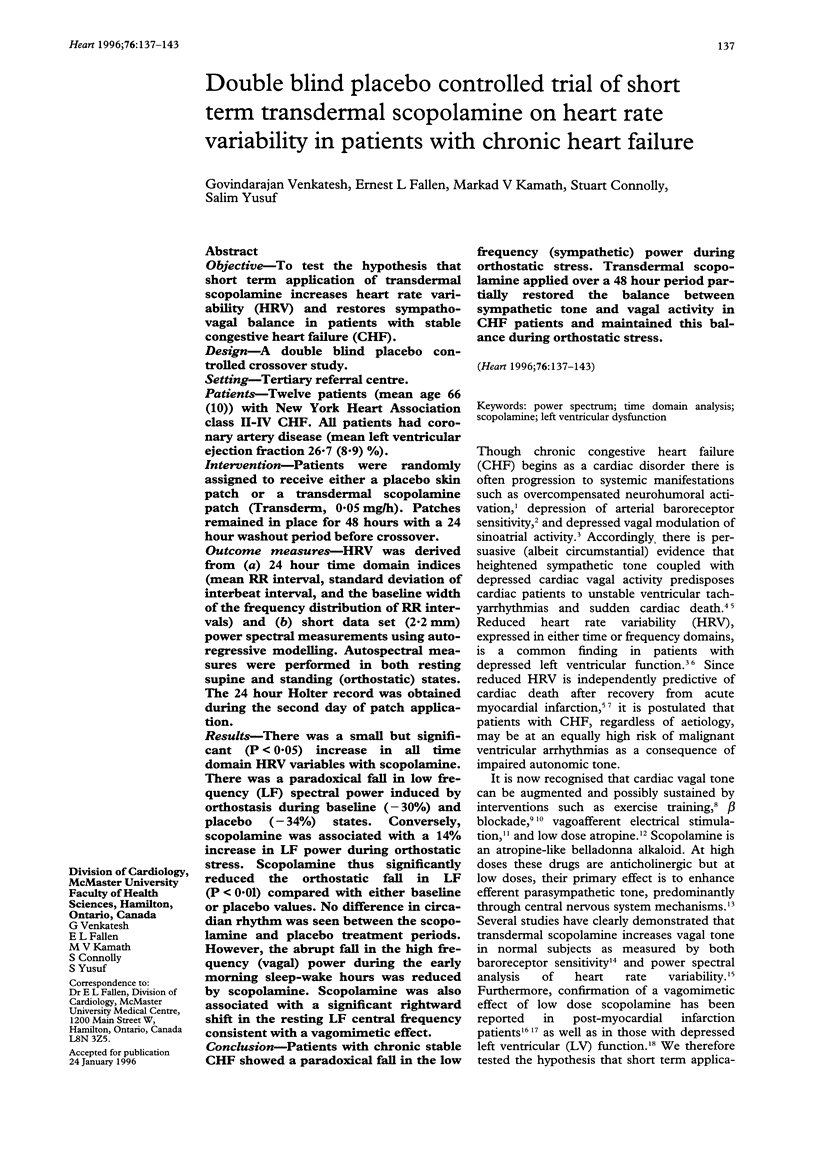
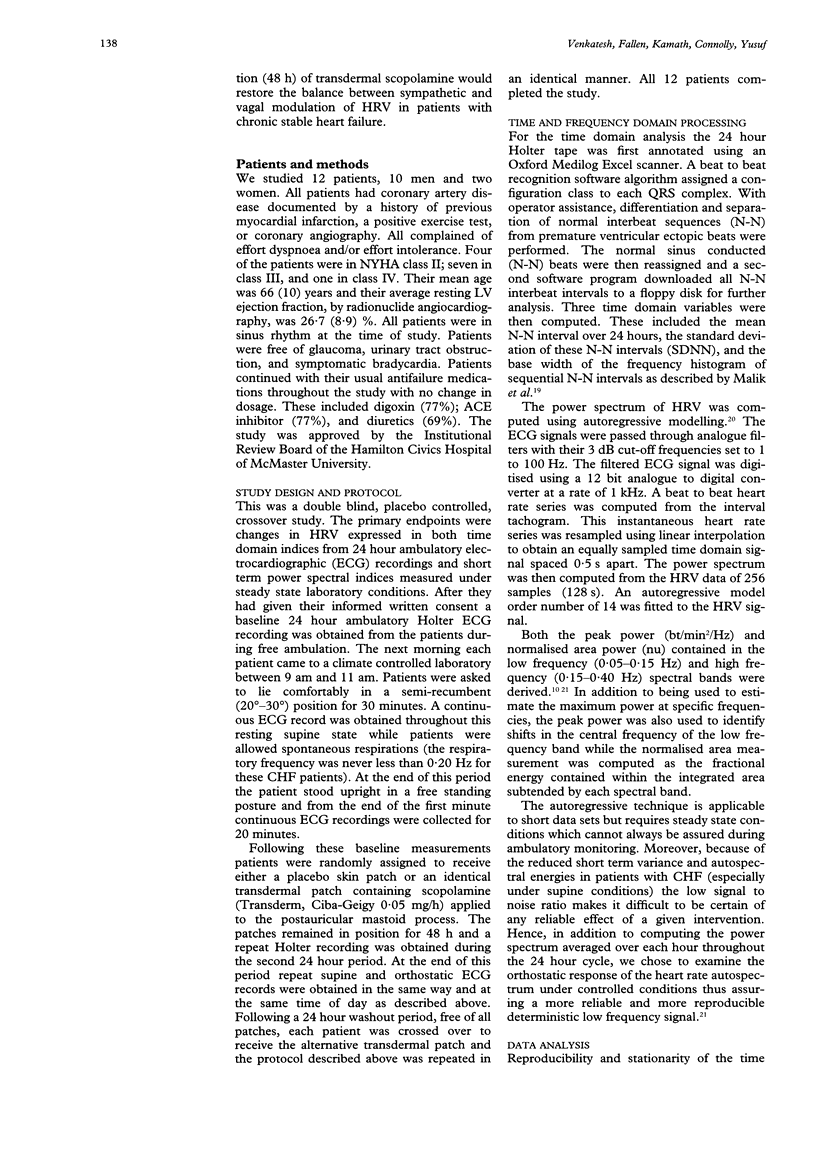
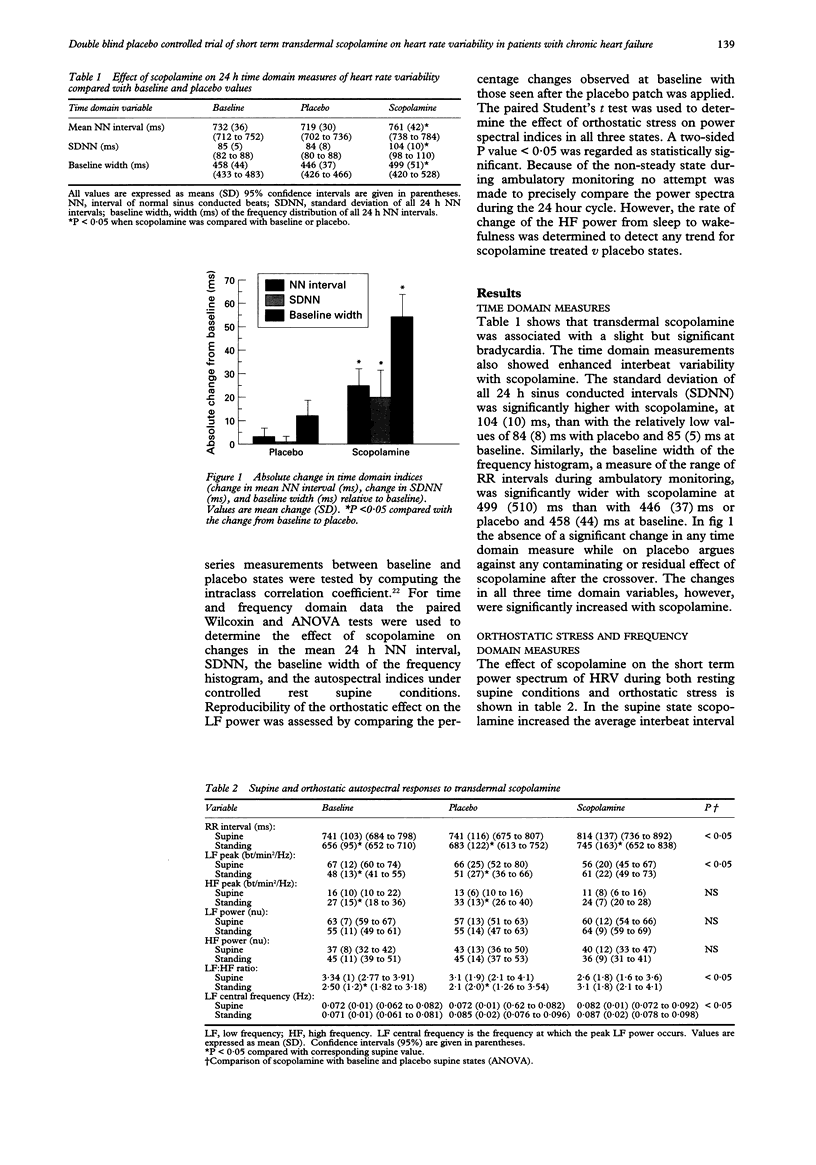
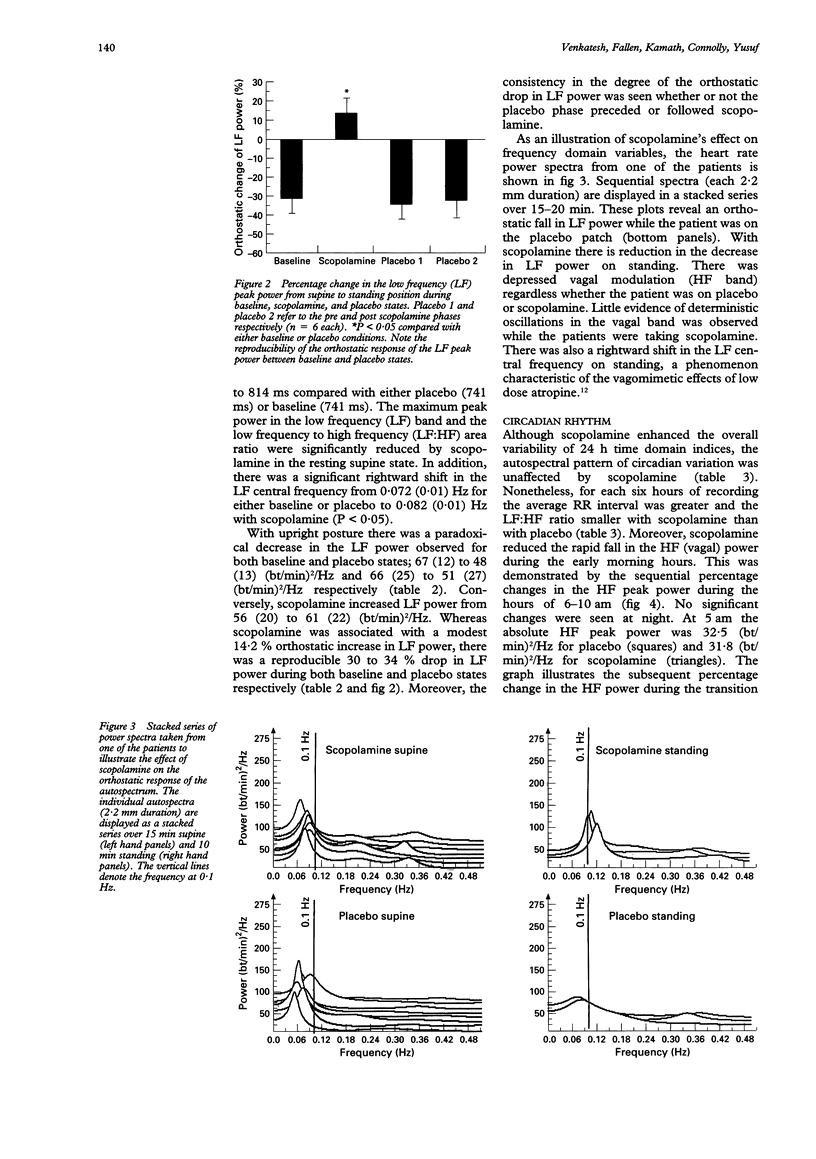
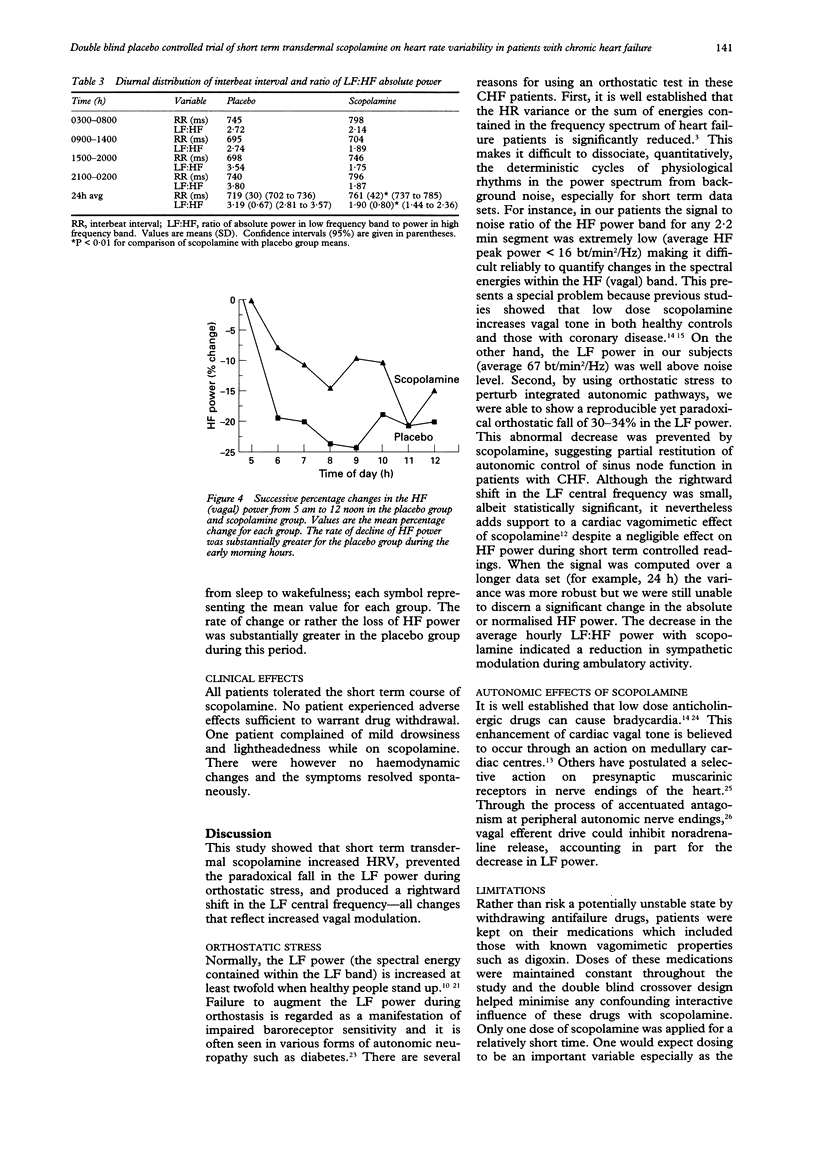
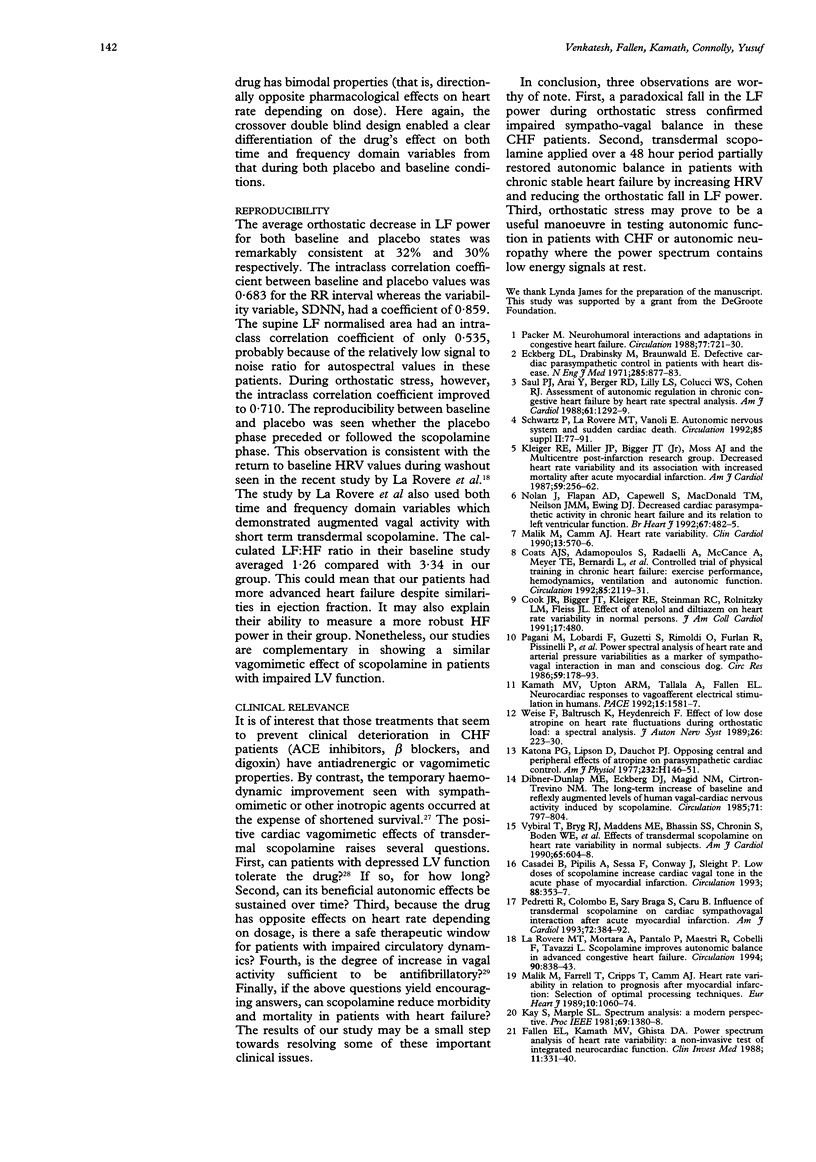
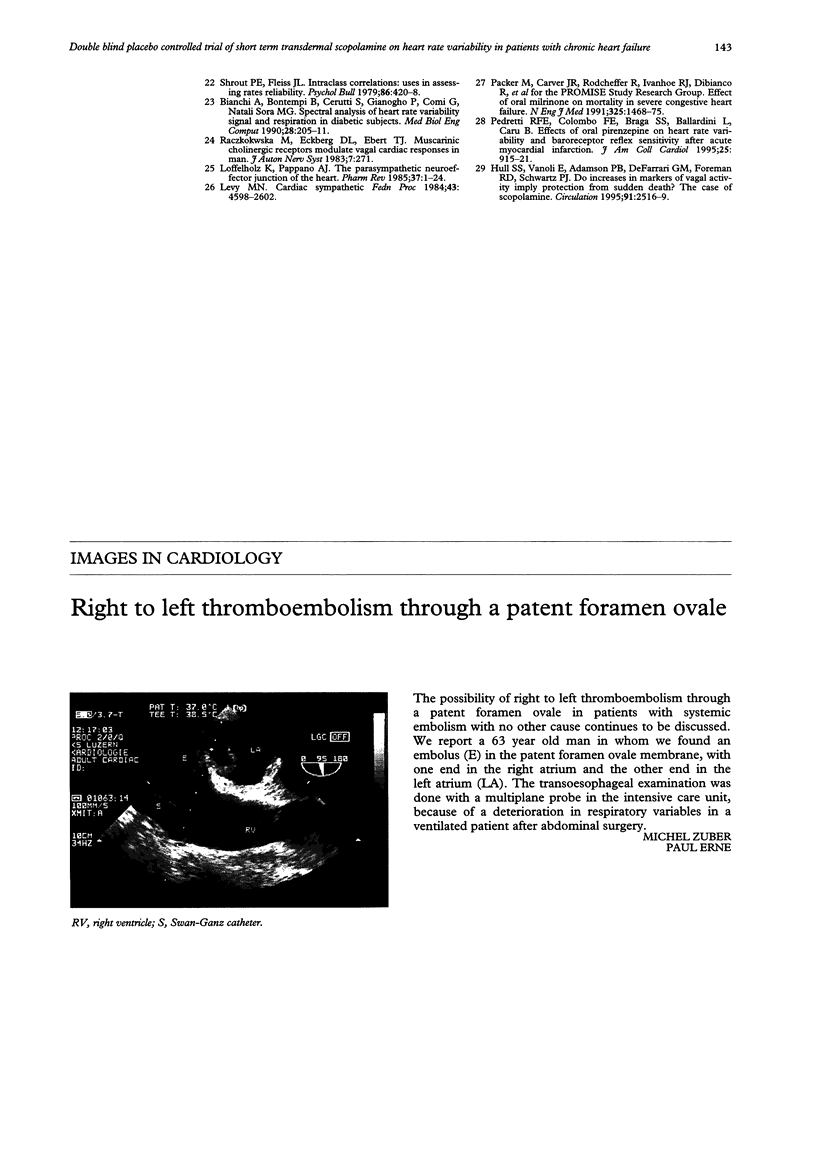
Images in this article
Selected References
These references are in PubMed. This may not be the complete list of references from this article.
- Bianchi A., Bontempi B., Cerutti S., Gianoglio P., Comi G., Natali Sora M. G. Spectral analysis of heart rate variability signal and respiration in diabetic subjects. Med Biol Eng Comput. 1990 May;28(3):205–211. doi: 10.1007/BF02442668. [DOI] [PubMed] [Google Scholar]
- Casadei B., Pipilis A., Sessa F., Conway J., Sleight P. Low doses of scopolamine increase cardiac vagal tone in the acute phase of myocardial infarction. Circulation. 1993 Aug;88(2):353–357. doi: 10.1161/01.cir.88.2.353. [DOI] [PubMed] [Google Scholar]
- Coats A. J., Adamopoulos S., Radaelli A., McCance A., Meyer T. E., Bernardi L., Solda P. L., Davey P., Ormerod O., Forfar C. Controlled trial of physical training in chronic heart failure. Exercise performance, hemodynamics, ventilation, and autonomic function. Circulation. 1992 Jun;85(6):2119–2131. doi: 10.1161/01.cir.85.6.2119. [DOI] [PubMed] [Google Scholar]
- Cook J. R., Bigger J. T., Jr, Kleiger R. E., Fleiss J. L., Steinman R. C., Rolnitzky L. M. Effect of atenolol and diltiazem on heart period variability in normal persons. J Am Coll Cardiol. 1991 Feb;17(2):480–484. doi: 10.1016/s0735-1097(10)80119-6. [DOI] [PubMed] [Google Scholar]
- Dibner-Dunlap M. E., Eckberg D. L., Magid N. M., Cintrón-Treviño N. M. The long-term increase of baseline and reflexly augmented levels of human vagal-cardiac nervous activity induced by scopolamine. Circulation. 1985 Apr;71(4):797–804. doi: 10.1161/01.cir.71.4.797. [DOI] [PubMed] [Google Scholar]
- Eckberg D. L., Drabinsky M., Braunwald E. Defective cardiac parasympathetic control in patients with heart disease. N Engl J Med. 1971 Oct 14;285(16):877–883. doi: 10.1056/NEJM197110142851602. [DOI] [PubMed] [Google Scholar]
- Fallen E. L., Kamath M. V., Ghista D. N. Power spectrum of heart rate variability: a non-invasive test of integrated neurocardiac function. Clin Invest Med. 1988 Oct;11(5):331–340. [PubMed] [Google Scholar]
- Hull S. S., Jr, Vanoli E., Adamson P. B., De Ferrari G. M., Foreman R. D., Schwartz P. J. Do increases in markers of vagal activity imply protection from sudden death? The case of scopolamine. Circulation. 1995 May 15;91(10):2516–2519. doi: 10.1161/01.cir.91.10.2516. [DOI] [PubMed] [Google Scholar]
- Kamath M. V., Upton A. R., Talalla A., Fallen E. L. Neurocardiac responses to vagoafferent electrostimulation in humans. Pacing Clin Electrophysiol. 1992 Oct;15(10 Pt 2):1581–1587. doi: 10.1111/j.1540-8159.1992.tb02937.x. [DOI] [PubMed] [Google Scholar]
- Kleiger R. E., Miller J. P., Bigger J. T., Jr, Moss A. J. Decreased heart rate variability and its association with increased mortality after acute myocardial infarction. Am J Cardiol. 1987 Feb 1;59(4):256–262. doi: 10.1016/0002-9149(87)90795-8. [DOI] [PubMed] [Google Scholar]
- La Rovere M. T., Mortara A., Pantaleo P., Maestri R., Cobelli F., Tavazzi L. Scopolamine improves autonomic balance in advanced congestive heart failure. Circulation. 1994 Aug;90(2):838–843. doi: 10.1161/01.cir.90.2.838. [DOI] [PubMed] [Google Scholar]
- Löffelholz K., Pappano A. J. The parasympathetic neuroeffector junction of the heart. Pharmacol Rev. 1985 Mar;37(1):1–24. [PubMed] [Google Scholar]
- Malik M., Camm A. J. Heart rate variability. Clin Cardiol. 1990 Aug;13(8):570–576. doi: 10.1002/clc.4960130811. [DOI] [PubMed] [Google Scholar]
- Malik M., Farrell T., Cripps T., Camm A. J. Heart rate variability in relation to prognosis after myocardial infarction: selection of optimal processing techniques. Eur Heart J. 1989 Dec;10(12):1060–1074. doi: 10.1093/oxfordjournals.eurheartj.a059428. [DOI] [PubMed] [Google Scholar]
- Nolan J., Flapan A. D., Capewell S., MacDonald T. M., Neilson J. M., Ewing D. J. Decreased cardiac parasympathetic activity in chronic heart failure and its relation to left ventricular function. Br Heart J. 1992 Jun;67(6):482–485. doi: 10.1136/hrt.67.6.482. [DOI] [PMC free article] [PubMed] [Google Scholar]
- Packer M., Carver J. R., Rodeheffer R. J., Ivanhoe R. J., DiBianco R., Zeldis S. M., Hendrix G. H., Bommer W. J., Elkayam U., Kukin M. L. Effect of oral milrinone on mortality in severe chronic heart failure. The PROMISE Study Research Group. N Engl J Med. 1991 Nov 21;325(21):1468–1475. doi: 10.1056/NEJM199111213252103. [DOI] [PubMed] [Google Scholar]
- Packer M. Neurohormonal interactions and adaptations in congestive heart failure. Circulation. 1988 Apr;77(4):721–730. doi: 10.1161/01.cir.77.4.721. [DOI] [PubMed] [Google Scholar]
- Pagani M., Lombardi F., Guzzetti S., Rimoldi O., Furlan R., Pizzinelli P., Sandrone G., Malfatto G., Dell'Orto S., Piccaluga E. Power spectral analysis of heart rate and arterial pressure variabilities as a marker of sympatho-vagal interaction in man and conscious dog. Circ Res. 1986 Aug;59(2):178–193. doi: 10.1161/01.res.59.2.178. [DOI] [PubMed] [Google Scholar]
- Pedretti R. F., Colombo E., Sarzi Braga S., Ballardini L., Carù B. Effects of oral pirenzepine on heart rate variability and baroreceptor reflex sensitivity after acute myocardial infarction. J Am Coll Cardiol. 1995 Mar 15;25(4):915–921. doi: 10.1016/0735-1097(94)00468-6. [DOI] [PubMed] [Google Scholar]
- Pedretti R., Colombo E., Sarzi Braga S., Carù B. Influence of transdermal scopolamine on cardiac sympathovagal interaction after acute myocardial infarction. Am J Cardiol. 1993 Aug 15;72(5):384–392. doi: 10.1016/0002-9149(93)91127-4. [DOI] [PubMed] [Google Scholar]
- Raczkowska M., Eckberg D. L., Ebert T. J. Muscarinic cholinergic receptors modulate vagal cardiac responses in man. J Auton Nerv Syst. 1983 Mar-Apr;7(3-4):271–278. doi: 10.1016/0165-1838(83)90080-2. [DOI] [PubMed] [Google Scholar]
- Saul J. P., Arai Y., Berger R. D., Lilly L. S., Colucci W. S., Cohen R. J. Assessment of autonomic regulation in chronic congestive heart failure by heart rate spectral analysis. Am J Cardiol. 1988 Jun 1;61(15):1292–1299. doi: 10.1016/0002-9149(88)91172-1. [DOI] [PubMed] [Google Scholar]
- Vybiral T., Bryg R. J., Maddens M. E., Bhasin S. S., Cronin S., Boden W. E., Lehmann M. H. Effects of transdermal scopolamine on heart rate variability in normal subjects. Am J Cardiol. 1990 Mar 1;65(9):604–608. doi: 10.1016/0002-9149(90)91038-8. [DOI] [PubMed] [Google Scholar]
- Weise F., Baltrusch K., Heydenreich F. Effect of low-dose atropine on heart rate fluctuations during orthostatic load: a spectral analysis. J Auton Nerv Syst. 1989 Apr;26(3):223–230. doi: 10.1016/0165-1838(89)90171-9. [DOI] [PubMed] [Google Scholar]



